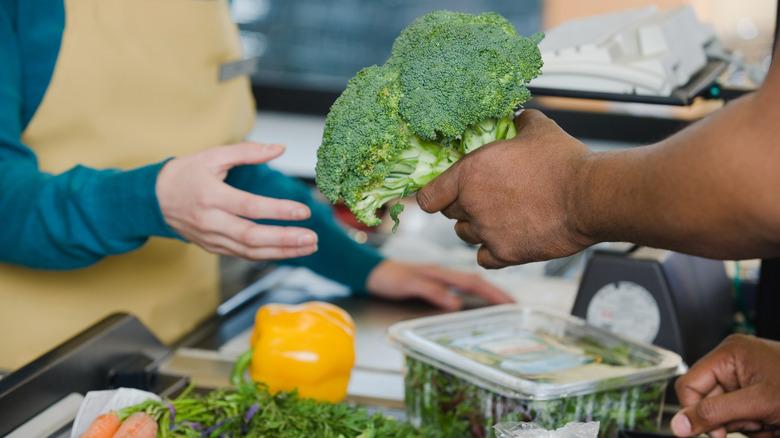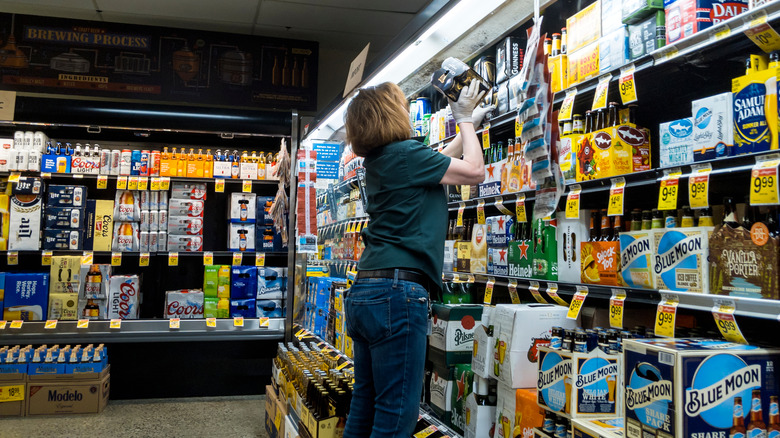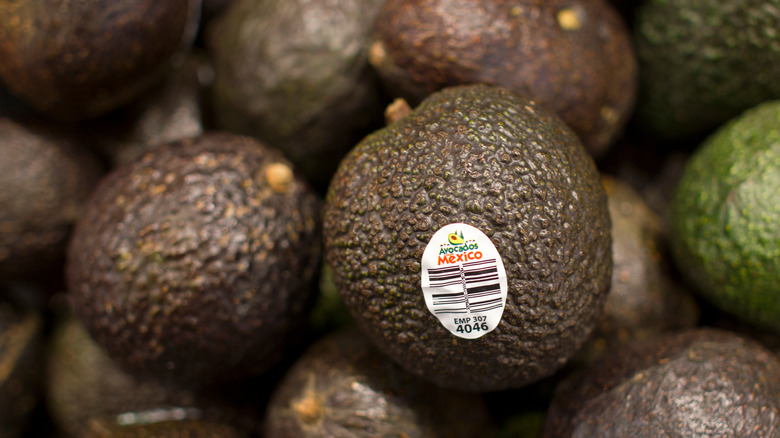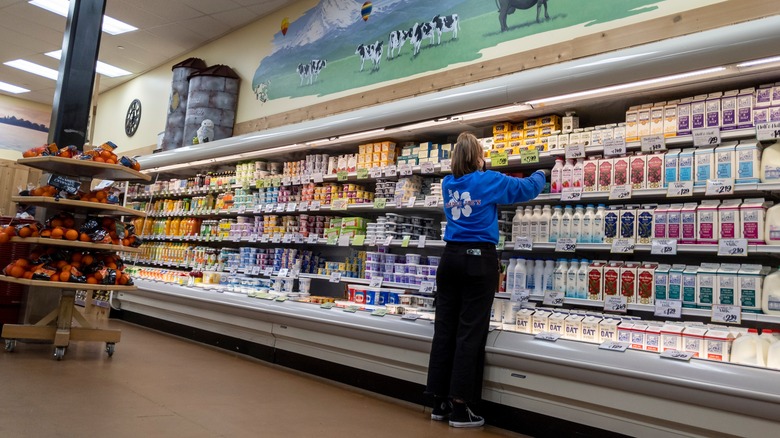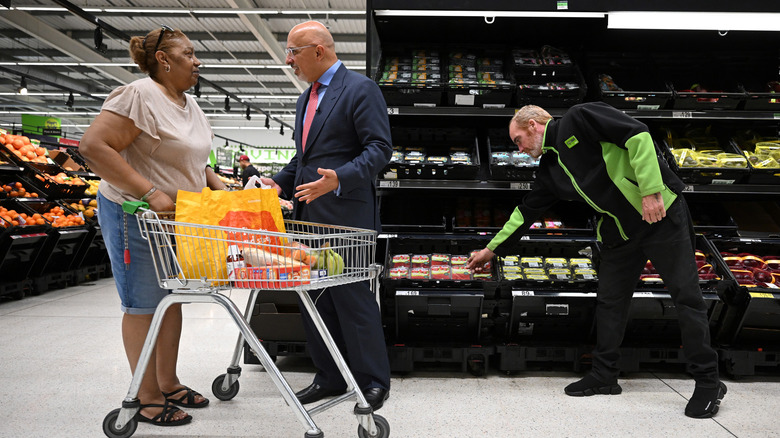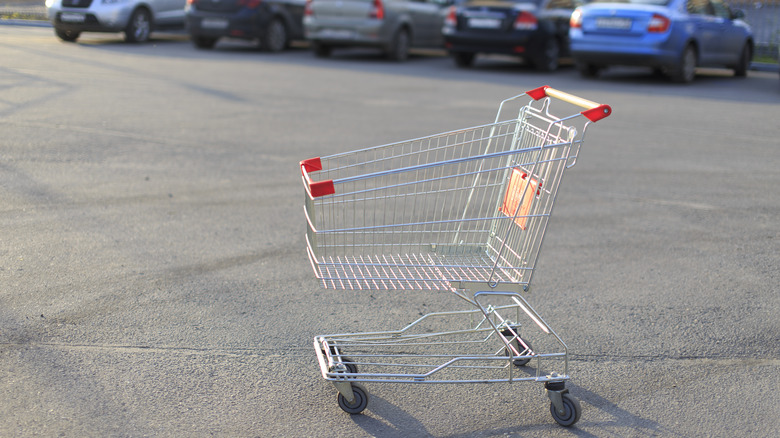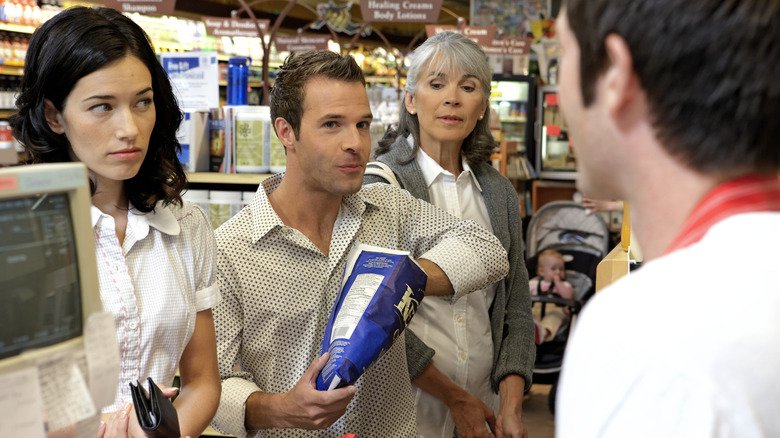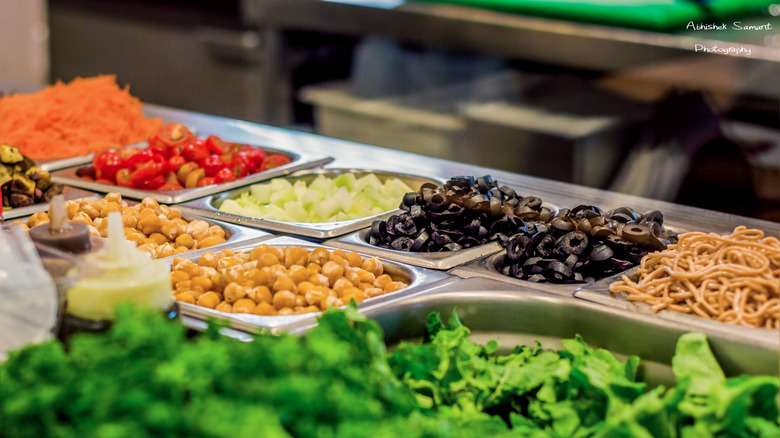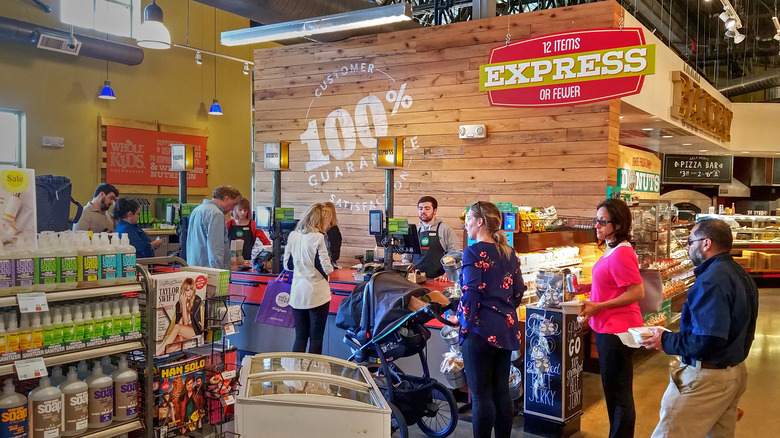15 Behaviors That Could Be Considered Rude At The Grocery Store
It can be stressful to weave your way through a grocery store, cart full to the brim, and shopping list in hand. Yet to some, a trip to the grocery store is a welcome chance to get out of the house. Either way, it's best to keep things enjoyable and stress-free. That means it's everyone's responsibility to work together to make the process as smooth as possible. Try to avoid behaviors that could be considered rude at the grocery store to keep your time at the market, and everyone else's time, enjoyable.
Some rude behaviors might seem perfectly harmless, or even helpful. So we've talked with an expert from the frontlines, Laura Furber, a retired Wellness Manager for the Hunger Mountain Co-op, to get the details. She lead the service team, which oversaw internal and external customer service for the co-op, and knows a thing or two about the dos and don'ts of customer behavior. We've tapped into her expertise and shared with you the ins and out of proper grocery store etiquette.
Handing items directly to the cashier
While it may feel rude to dump your findings onto the conveyer belt while the cashier works hard to keep up, the truth of the matter is that this is the most efficient and preferred way to keep things moving. The conveyor will move at the cashier's pace, keeping the flow steady. It's best to give people a little space when they are doing their job. It can actually be frustrating to have customers set the pace, especially if there is a long line behind them.
If you want to be helpful, place similar items together such as refrigerated items, heavy items, or delicate produce. This way, it will be easier for either you or the bagger to keep items cold or to prevent them from crushing one another once bagged. If you've been feeding your cashier groceries one at a time, don't fret, they probably recognized your intention to be polite. But from now on, resist the urge, take a step back, and let them work their magic.
Asking the wrong people questions
Have you ever approached someone who appeared to be a staff member at a grocery store with a question and they looked at you like you had two heads? Even if someone is head-to-the-grindstone and wearing a badge, it doesn't necessarily mean that they are employed by the grocery store. Many brands stock their own product, especially companies selling alcoholic items. These vendors are hard at work, but may not be able to answer your questions.
The rule of thumb is just because someone looks busy, that doesn't mean they work there. Look for an employee name tag or uniform that has the logo or name of the store you're currently in.
If they don't carry the item you're looking for, remember that this is not their fault. Furber states that customers often get frustrated with service team members when they can't get the items they want. She states, "The thing that jumped out to me was how agitated and frustrated customers could get when we didn't have what they were looking for. The supply chain was severely disrupted during the pandemic and even when customers were offered alternatives, they could get upset, and that certainly could impact team members." Stick by the golden rule, and remember that if the worst thing that happened to you today is that you couldn't buy your favorite brand of chips, you're doing pretty well.
Trying to help the cashier with item recognition
We can assure you, the reason your cashier is turning over that spaghetti squash isn't that they don't know what it is, it's because they are looking for a numerical code associated with the produce. Blurting out "it's a spaghetti squash" could be considered rude. People take pride in their work and it can make them feel unaccomplished or undermined. That being said, if you have a rather unrecognizable bounty, your cashier might ask you for help identifying the product. At that point, it's perfectly fine to fill in the gaps, but it's important to receive that cue.
Again, this could seem like harmless or even helpful behavior. But the truth is that everyone wants to feel confident and efficient at their job, and if they're constantly having customers explain to them what basic fruits and vegetables are, it has the potential to wear on them. It's best to let the cashier do their job, and if they need your help, they will certainly ask for it.
Acting like the employees aren't there
Ahh, the age-old question. Is it ruder to interrupt an employee at work or avoid disturbing them by reaching around their body to grab an item? This one is a bit of a head-scratcher because while both answers may seem perfectly acceptable, one is actually considered rude. If a team member is hard at work stocking a shelf, and you just need to sneak through to grab one item, pipe up. Address them directly, make eye contact, ask politely if they wouldn't mind you grabbing your item, and then thank them afterward.
Reaching around to someone like they aren't there, or are just another fixture of the store, is quite dehumanizing, and can make employees feel undervalued. Even if you have the best of intentions to not interrupt their hard work, it's best to just make your presence known and include them in the interaction. Because, in the end, no matter how sneaky you are, they will notice you anyway and would rather be addressed directly.
Making unnecessary comments
If you're used to clicking a few buttons on Instacart and having items delivered directly to your house, it's easy to sink into a pattern of isolation. In-store grocery shopping is on the rise due to an increase in grocery costs, so everyone is coming out of the woodwork. With isolation sometimes comes out-of-practice social skills, and while some individuals might be desperate for human interaction, that doesn't mean you can strike up conversations with people about what's in their shopping carts. Everyone has a right to a little privacy. A good rule of thumb is if it's passed the threshold of the cart, the conversation is off-limits.
On the flip side, for comments to staff about products or an in-store experience, Furber recommends going straight to the customer service desk instead of tracking down random employees. She states, "It's natural to want to provide feedback on what a store offers, and the store should make it as easy as possible for that to happen. A customer should be able to offer that at the customer service desk, or in many cases, in the actual department." Furber explains that if there is negative feedback, they want to hear it. Keep your cool, and keep the conversation constructive as much as possible.
Leaving your empty cart loose
While many of these behaviors may seem polite until proven otherwise, there is no mistaking this major grocery store faux pas. Once you've grabbed a cart, it is your responsibility until you've put it back where it belongs. You are borrowing it from the store, and it's always expected to be returned to any one of the designated cart areas. Grocery stores often place cart storage areas at the front of the store for easy grabbing and even have storage racks in the parking lot. Grocery stores even place cart holders at the exits of stores to aid shoppers that may have forgotten an item or two (as we all do now and again).
Abandoning your cart in the store, empty or not, or leaving it in the parking lot on the loose when you're done with it, is terribly rude. It shows the world that you're unable to follow the simplest of societal rules and that you believe your time is more valuable than anyone else's. The reality is that your loose cart is actually considered dangerous. A gust of wind could take it into someone's car, or worse, it could hit a pedestrian. The next time you're debating whether or not to make that terrible 20-second trek back to the cart holder after you've unloaded your groceries, think of others.
Snacking while shopping
Never grocery shop hungry. You'll end up buying way more than you need, and splurging on sweets and salty snacks that you're craving in your hungry stupor. This doesn't mean, however, that you should pop open a bag of chips the second you get into the store. Until you've paid the cashier, those chips don't belong to you.
In addition, grocery stores aren't set up to serve food beyond occasional samples. It's not the employee's responsibility to pick up your trail of crumbs, and all in all, it's a health hazard.
The next person to use your cart doesn't need to grab onto a greasy handle. Keep your germs in your mouth, the grease and crumbs in the bag, and your fingers out of the products until you stepped outside into the fresh air. We recommend enjoying a hearty snack like a peanut butter smoothie or some hummus toast before venturing on your grocery shopping excursion to avoid temptation.
Letting your kids rule the roost
It's so important to let children experience the world, learn with their hands, and interact in society. It builds important social and life skills. However, the grocery store isn't your personal classroom, so it's important to follow the same rules and tips you would use when bringing your kids out to eat at a nice restaurant. Try to go during off hours if possible so your wandering children won't get lost or trampled in a crowd. If they start to have a tantrum or things get out of hand, leave your cart near the front with an associate and take a walk. And finally, if your child is either in danger or creating a dangerous situation for other customers, know when to pack it up. Maybe opt for Instacart today, and try again later when your child is less fussy.
While most people understand the need to bring a child along grocery shopping, it's important to keep a close eye on them. Grocery stores are big, crowded, and full of breakable and sharp objects. If you believe they might try to climb shelves, will sprint out in front of carts, or create havoc, pop them in the baby seat located in every shopping cart.
Running back to grab forgotten items
You've finally made it to the checkout counter after multiple circles through the store. Your basket is filled to the brim with items you didn't even know you needed until they popped out of the shelf at you and begged to be brought home. You walk up to the register and, oh, no. You've forgotten the toilet paper you came in for. Don't run back and grab it. The line behind you, or the inevitable line that will form after you leave, will become frustrated with your disappearance. The cashier will be at a stalemate because they are unable to ring anyone else up until you close out. Don't waste anyone else's time. Just pay, load up your groceries, drop them off in your car, and head right back into the store. We all do it.
While this may seem like a waste of time, consider whose time you'll be wasting. That being said, if the store is relatively empty and the cashier gives you the go-ahead, dash for that TP, and just make it quick.
Talking on the phone loudly while shopping
It's almost surprising to see someone walking around in public without headphones these days. While it used to seem odd to hear someone chatting away with no phone in hand, the sight is now rather standard. Because we've been blazing the way for cell phone etiquette in the last decade, the rules may still seem a little confusing.
Sometimes being on the phone is a must. Maybe your partner's list looks like it was written in hieroglyphics, and what the heck is a kabocha squash anyway? The extra support and guidance can come in handy, so just be sure to keep your conversation at a volume you would use to speak to someone next to you. For some reason, there is a tendency to shout when we are on the phone, but it's entirely unnecessary. Use your indoor voice, and please do not even consider using speakerphone. This isn't your living room, it's a shared space, so be mindful of other shoppers and employees.
Sampling from the salad bar
Hot bars and salad bars are great resources for those who need to grab a quick meal on the go. Hot bars are a huge lifesaver for those with short lunch breaks or long work days. There are a few things to consider before buying food from your grocery store's hot bar, like the price per pound. That might make sense when grabbing steamed salmon or fresh ravioli, but might not be worth it for a container of mashed potatoes. Either way, feel free to load up your plate or to-go container but keep one simple rule in mind: This is not a sample station, so do not taste the food from the bar until you've bought it.
Not only is this behavior unsanitary, but it's also considered stealing. And while you may be thinking, "it's just an olive," it really adds up if everyone takes a bite or two. It's best to keep things black and white. Wait until you've paid before indulging.
Taking up the whole aisle with your cart
Inflation is changing the way we shop for groceries. Some of our favorite products just don't stay in stock, and prices are souring which makes bargain hunting an even longer process. You may find yourself standing in the aisles staring for much longer than you used to, and that's okay. When this happens, just be wary of other shoppers and your surroundings. Grocery store aisles are often quite narrow and only allow for two carts to fit through at a time, so if you haven't pulled your carriage over to the side, you may be causing a roadblock.
Don't get us wrong, we are huge proponents of taking your time in the grocery store. Simply check your surroundings before coming to a halt, and pull your cart over to the right side of the aisle (unless you're in a left-side driving country). Stay close to the shelf when browsing, and if you notice someone waiting behind you, give them the go-ahead to grab what they need. Then, take your sweet time, and pick exactly what you need.
Relocating items
It's getting close to dinner time and you've grabbed most of the items on your grocery list. You've finally made it to the last aisle and your spouse texts you that they've already picked up bananas this morning. Imagine the overabundance you'd have if you brought home another bundle. The clock is ticking, and you're so tempted to just leave them nestled in between a box of Cheerios and Wheaties. After all, people eat bananas with their cereal, right? While your logic may be strong, it's no excuse to abandon items where they don't belong. Surprisingly enough, this happens with even refrigerator and freezer items that then spoil and must be discarded by staff.
You can imagine how frustrating this must be for team members who are just trying to stock shelves when they then have to stop what they're doing to pick up after customers.
That being said, if you can't remember where you grabbed the item from, drop it off with the customer service department.
Going through the express lane with an overflow of items
The express line is truly reserved for customers that are just picking up a handful of items. Each scan counts as one item. So if you've purchased 12 jugs of apple cider, each of those counts as one item, they don't count as one unit. It can be tempting if you have very few items but clearly didn't make the cut to just jump in line and play dumb, but the truth is that everyone around you will notice, including the cashier. It's not polite to fudge the rules.
While this may not seem like a huge deal, and it's likely nobody will kick you out, it's just plain rude. Why must everyone else follow the rules while they don't apply to you? There is a system in place to make everyone's life more convenient, and by messing with that system, you are showing the world that you think you deserve special treatment. There are so few rules at the grocery store anyway that it doesn't hurt to just go with the flow, be considerate of others, and stick to what's right.
Treating others with disrespect
Furber explains that the customer experience is greatly affected by the overall culture of both the customers and the staff. If you're an employee at the grocery store, don't overlook the importance of treating your fellow employees with respect. She states, "Our philosophy was simple — offer a greeting, ask the customer if they needed help finding anything, and if there was a problem to work on 'making it right.' Lastly ... we put a huge emphasis on how we treated each other as co-workers, and this seemed to set the tone for the store and ultimately make it a friendlier place to shop. Honestly, we started to get fewer complaints."
The overarching theme for both customers and team members is to live by the golden rule and treat others the way you would like to be treated. Going out of your way to make eye contact, greeting someone before asking a question, and thanking them can go a long way to nurturing a cohesive and positive atmosphere and culture.

